LINDA
MAQOMA:


ON LIFE, LEADERSHIP ACTIVISM & INDUSTRY
INSIDE: DECABORNISING THE WORLD TO NET ZERO BY 2050
DIGESTS: THE MISSING LINK IN SA’S EDUCATION MISSION
MINING: WILL THE SECTOR SUPPORT ENERGY TRANSITION
BANKING: BANKSETA, CHAMPIONING DIVERSITY IN BANKING

The Journal for a Transforming Nation. ®
VOLUME 33 2023 ZAR 29.90 ISSN 2520-9248 2 203
ABASA PRESIDENT


www.transformsa.co.za


18

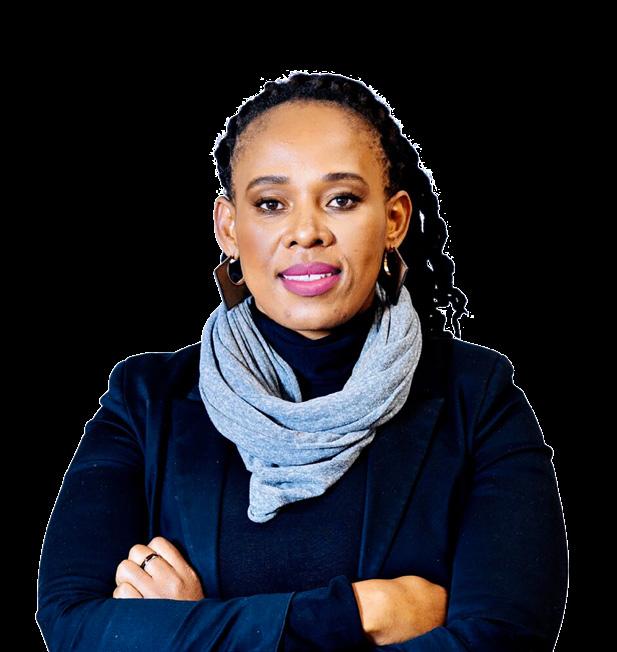

4 www.transformsa.co.za contents 26 24
Publishing Editor: Sakhumzi
Mabhele 6 Foreword: Tshetlhe Litheko 8 Contributors 9 Guest Note: Zimasa Macingwane 10 Digests 12 Advertorial 14 B-BBEE 16 Cover Story 18 Think Piece 22 Professional 24 Mining 26 ICT 28 Entrepreneurs 30 INSIDE
“As you rise and your head is in the clouds, your feet should always be on the ground. Because you have a responsibility, you need to know what’s happening on the ground.”
“Saki”


When the World Bank released a damning report about inequality in Southern Africa at the beginning of 2022 one would have expected a concerted attempt and a rigorous undertaking to reduce the inequality gap. According to the report South Africa continued to be amongst the most unequal countries in the world ranking first among 164 measured countries. The report did not shy away from linking its findings to race dynamics in South Africa placing on the spotlight the sad reality that black people remained poor with little access to employment opportunities. As we start 2023 the expectation is that there will be various promises starting with the state of the nation address followed by the budget speech and provincial statement. Many will hope to see a difference which has proven quite a mission to accomplish in the past. The World Bank report stated that about 10% of the population owns about 80% of the country’s wealth, a clear indication that transformation is failing in South Africa.
If the intention through the Broad-based Black Economic Empowerment (B-BBEE) Act was to eradicate the socio-economic disparities that were created by the apartheid regime, then it has failed to yield the expected results. Whether this failure is attributed to the provisions of the Act or the
publishingeditor
implementation of the Act that could be debated. We are approaching three decades since South Africa became a democracy and yes, the poor remain poorer.
The time has come for Africans to look beyond the systems that were developed to undermine success and triumphs of the people of Africa. The time has indeed come for Africans to seek solutions from within, recognise African talent, take charge and advantage of what is uniquely African. Initiatives such as the African Continental Free Trade Area (AfCFTA) present a rather unique opportunity for Africa to advance its economic ambitions.
In this edition our lead story is that of Linda Maqoma, the President of the Association for the Advancement of Black Accountants of Southern Africa (ABASA) whose journey resonates well with the efforts of transformation.

Inequality in South Africa should also not be dealt with in isolation or outside the socio-economic realities of the African continent. There are known similarities and socio-economic challenges in various African states where Africans remain poor with little or no access to resources and economic opportunities.
We also have our usual features looking at professionals who are leading in various institutions. One such individual who shares great leadership insights in this edition is Germinah Nyikana of Clicks. In addition, we have entrepreneurs who continue to create job opportunities even during tough economic times.
Sakhumzi “Saki” Mabhele
6 www.transformsa.co.za
Inequality in South Africa should also not be dealt with in isolation or outside the socioeconomic realities of the African continent.
Enjoy the read
PREFACE

About 5 years ago, there was an attempt to answer the same question. I was invited by Black Scientist, Technicians, and Engineers Professional (BSTEP) to speak to their cohort of inventors seeking funding for their innovations. As part of motivating the young inventors and effectively Black Industrialist to be aligned to the industrial process (Invent, Prototype, Get technology readiness through prototyping and be first to market), I formulated the theory on thriving societies.
The theory goes something along this chain of thoughts. Every individual is an economic actor, and they have an agency to be central in how they economically survive. However if you were to compare me as an actor to a Bushman, the Bushman may at individual level have better skills to economically thrive. His hunting skills, survival skills and knowledge of the wild provides some qualities that edges him ahead of me.
Note that this is not a function of education, many extremely educated societies are neighbours to South Africa, but for lack of productive knowledge and a limited basket of products they can produce, these population have found solace in South Africa.
While indifference can be a plague and apathy can restrict one to irrelevance, a reflection on the South African productive systems requires a careful review. The South African auto-industry hosted its first Thought leadership dialogue through an event called the SA Auto week in October 2022. Vehicle manufacturing is the single biggest, industrial sector in South Africa and contributes around 7% to the national GDP. The ability to continue producing vehicles adds to the resilience of SA as a thriving society. This makes all developments in the industry of national importance, especially if the sector presents opportunities to develop more sophisticated products like Electric Vehicles.
Our primary markets in the UK and EU will stop buying petrol engine vehicles as early as 2030, which are currently producing. Fully placing on a count down our ability to continue thriving in these areas. The current barriers preventing or threatening such an eventual future include trade policy adjustments and improved price points for broader penetration.
Banking also requires some reflection as it holds promises for a thriving society. Just over century ago banking was a limited to individuals placing their money in a town’s treasury and hoping Billy the Kids does not break into the building. In the 70s ATM became the second revolution for the industry. Then at the Apex of the 90s, EFTs and internet banking became the third revolution. Towards the end of 2022, we were fully in the fourth revolution of banking already, and FINTECH has made banking already far wider and less intrusive than it has ever been. Airtime advance from my cellphone provider is banking and a new indirect form of micro-lending.
South Africa as a Thriving society needs production systems that are capable of responding to the innovation disruptions such as FINTECH and Electric vehicle. South Africa’s manufacturers need to stay in the innovation cycle to further develop their production capability or respond to emerging technologies such as electric vehicle production. Be Inspired SA!
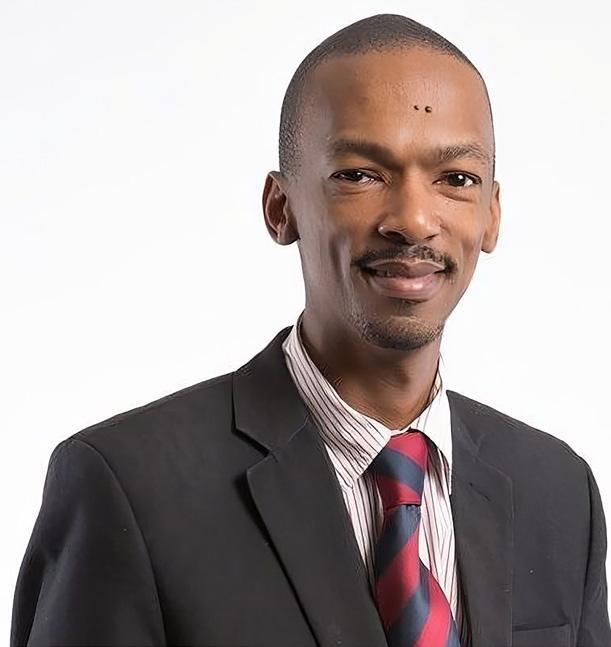
8 www.transformsa.co.za
In a world full of battles for ideas, there is perhaps one outstanding question that remains hard to resolve. “Why are some countries richer than other countries?”
PREFACE
Tshetlhe Litheko
Contributors
GEORGE MFANA SHIKHATI

George Mfana Shikhati founded Make A Difference, a non-profit organisation dedicated to aiding underprivileged families by donating school uniforms and food. As the COVID pandemic presented an obstacle for individual giving, George found another solution: selling eggs in Thembisa. This efficient initiative has provided sustainable income used to help those who need it most.

LIZEKA DLEPHU
Lizeka Dlephu is a force to be reckoned with in the sustainability field, currently serving as Head of Sustainability at Enel Green Power Southern Africa. She has also made an impressive impact on South African civil services. Lizeka previously served as B-BBEE Specialist and Transformation Manager responsible for promoting business transformation. She was HR Director in the civil service sector, and now works independently as a Non-Executive Director of the Civil Aviation Authority.
MBONGISENI SILOMOTION SANGWENI
Mbongiseni Sangweni is a highly accomplished Managing Director with extensive experience in the media production arena. His specialties include Business Process, Financial Risk Management and Health Insurance as well as top-notch analytical skills and impressive business relationship expertise. He holds a National Diploma from the University of Johannesburg, where he majored in Mechanical Engineering - all setting him up for success!
LELETHU MBIKENI
In 2016, Lelethu Mbikeni embarked on a career journey full of surprising accomplishments. After completing her tertiary studies at Cape Peninsula University of Technology, she joined a Fintech company in Cape Town as a consultant. She soon found her passion for management roles - where her leadership acumen allowed unprecedented potential to be realized through transformative results. This led to further growth into the Software Development Project Manager position before founding Hope Cleaning Services with herself as sole Director, meanwhile finding time amidst it all to partake in road running for fitness and fun.


Volume 33 • 2023 9 CONTRIBUTORS
Decarbonising the World to Net Zero by 2050
The energy sector, transportation and agriculture are among the highest emitters of greenhouse gas emissions. The world is moving away from fossil fuels and encouraging sustainable renewable energy projects to reduce our carbon footprint, various forms of renewable energy are being explored to replace the existing energy generation facilities. We are a generation that is highly dependent on energy; therefore, it is a crucial component in sustaining human life, economic growth and industrial activities.
During the IMO (International Maritime Organisation) Maritime Day Parallel Event which was hosted by the City of Durban, South Africa has shown its support for the IMO emission reduction strategy, by finding new innovations and technologies to supply reliable and environmentally friendly greener shipping fuels. Industries are advocating for a greater inclusion and participation of the public and private sectors to work together in addressing the country’s energy transition plan. This is to ensure the country meets its decarbonisation targets and no one is left behind.
The world is trying to decarbonise to net zero by 2050 towards the goals of AIM 2050, with residual emissions from hard-to-abate sectors. I have been privileged to have been part of the
Open Africa Power 2022 Programme by the Enel Foundation and the EUI Florence School of Regulation. The programme encourages critical thinking and practical solutions in decarbonising the energy sector and ensuring sustainable, affordable, quality and reliable access to energy. With a road map on how we can ensure 100% electrification in the country by 2030.
My Masters’s research MSc in Maritime Affairs, where I became the first South African female to Specialise in Maritime Energy Management was focused on wave energy and the production of green hydrogen through electrolysis. The research title was Wave energy a new energy mix to produce green hydrogen, a study on the Port of Ngqura, Southern Africa’s “Green Status Port”. I conducted a simulation using energy produced from the wave farm and the results showed that with wave energy converters in a row of 3 next to each other the energy produced by the wave farm was 2.973 GJ per month, which is equivalent to 18.58 tons of produced hydrogen, when we consider the lower heating value of hydrogen and if we assume hydrogen production efficiency is 75%. One of the findings showed the wave farm will produce enough hydrogen fuel to refuel a tugboat each month.

10 www.transformsa.co.za
GUEST NOTE
Zimasa Macingwane
details publisher’s
Publisher
Publishing Editor
PAPASHA MEDIA (PTY) LTD
Sakhumzi “Saki” Mabhele 1 York Street, Kensington B, Randburg 2194
Tel: 010 023 1845
Fax: 0866 11 44 78 saki@transformsa.co.za
Media Liaison: Production Media Assistant:
Design & Layout Printer
Content Development
Advertising Sales
Editorial Enquiries
Advertising Enquiries Head of Operations
Online Advertising General Enquiries
Andiswa Gqamane Arefa Seleho
Papasha Design
SAKIPRINT Litho
Dumisani Hlatswayo
Oarabile Dilebo, Vusumzi Melane editor@transformsa.co.za
advertising@transformsa.co.za
Shumikazi Bhuka shumikazib@papashamedia.co.za
onlineads@transformsa.co.za info@transformsa.co.za
Tel: 010 023 1845
Fax: 0866 11 44 78 www.transformsa.co.za
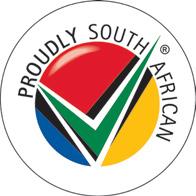
Facebook page: Transform SA
Twitter page: @Transform_SA
TERMS AND CONDITIONS OF USE / DISCLAIMER
Transform SA is a product of Papasha Media (PTY) LTD . 1 York Street, Kensington B, Randburg, 2194. Transform SA (ISSN No. 2079-7273) considers its sources reliable and verifies as much data as possible. However, reporting inaccuracies can occur, consequently readers using this information do so at their own risk. Transform SA is sold with the understanding that the publisher is not rendering a legal or advisory service. Although companies and contributors mentioned herein are believed to be reputable, neither SAKIPRINT (Co. CK2002/063910/23), nor any of its employees, sales executives or contributors accept any responsibility whatsoever for such persons’ and companies’ activities. SAKIPRINT CC. All rights reserved. No part of this publication may be reproduced, stored in a retrieval system or transmitted in any form without prior written permission of the publisher. Permission is only deemed valid if approval is in writing. Transform SA buys all rights to contribution, text, images unless previously agreed to in writing.
Stock images supplied by Shutterstock.com
Volume 33 • 2023 11 The Quarterly Journal for a Transforming Nation
The Missing Link in Higher Education
The future of our country lies with the youth, but a great portion of our country’s youth are jobless and idle, and some fell into drugs.
Written by Matome Seketa
SA’s
Energy Supply Crisis
As we plunge into the fourth industrial revolution, there is so much potential and so much we can benefit from our youth. In spite of this, we are further away from greater opportunities as a result of the miseducation and backwardness of our educational institutions. We should have been milking the opportunities presented by the fourth industrial revolution to better our country and keep the youth employed but we are failing greatly as a society.
It’s, unfortunately, a ticking time bomb now, and is either we adapt or we diminish. It’s time that South Africa’s rigid government and the public institution of higher learning get off their immovable high horses and make way for the in-demand skills.
It is ironic that institutions whose sole and main mandate is to foresee the future and help proactively prepare for it are failing to educate the youth in line with where the world is going.

Universities and colleges are still enrolling learners to study in fields whose days are far left behind despite how clear it is the world has changed. Education is no longer just about learning facts and regurgitating them. We are in dire need of creative, data enthusiasts, and technology-obsessed thinkers. Our institutions of higher learning ought to reposition themselves to create educational environments encouraging the development of such thinkers, not people that are overly informed about irrelevant subjects.
With skills in short supply and jobs going unfilled in fourth industry-related fields, and skills over-supply in other fields, it’s time that tertiary institutions looked at training the youth for the reality that is outside their rigid walls. Today’s youth need relevant skills that can be applied in this real world, and not what the world used to be like.
We recognize that our country has an abundance of coal, but coal alone, along with other high-emission sources, is insufficient to meet the country’s energy demands.
Eskom’s failure to meet the country’s power demand is a result of poor planning and our leader’s inability to take proactive measures. We desperately need cost-effective alternatives, especially for the poor and marginalized.
We can only assume what’s in the plan. Our government has recently submitted to donors who have pledged $8.5bn to help the country’s transition to renewable energy.
So far, President Cyril Ramaphosa has made a list of unending announcements and ‘plans’ to implement renewable energy and end the days of load-shedding but nothing tangible has been presented thus far.
As long as we have incapable, greedy, and freeloaders for leaders our load-shedding days will never end. Rumours that load shedding emanates from a capitalist conspiracy to create an impression that the state is failing to sustain the entity for citizens to think the SOE can only thrive under private ownership cannot be out-ruled either.
Recent scandals surrounding our president indicate how ambitious he is as a businessman and a capitalist, so much so that he does not mind bending the rules in his favour.
The solutions to our power problems include issuing licenses to private companies to supply energy and compete for the market. Eskom must also adopt renewable energy at a more rapid speed.
The cost savings from using renewable energy and issuing a leeway to private companies to supply power can offset the initial investment costs, and save South Africans money in the long run.

12 www.transformsa.co.za DIGESTS
Although renewable energy systems are costly to implement, they cannot be equivalent to the diabolic cost of recurrent load shedding on our economy.
IS SA’S ENERGY TRANSITION VIABLE ?
As mining companies race to become net-zero by 2050, there are a couple of factors they need to get in order. A recent report by PwC emphasizes the importance of mining companies preparing themselves for a low-carbon economy. To achieve this goal, mines need to adopt sustainable mining practices and other innovative approaches. However, it would be shortsighted of us to assume that the transition will be smooth. As with any transition, we should expect some hiccups and challenges.
The main challenges we face as a country include the following:
1.
Climate financing
Financing has been a major obstacle to South Africa’s climate transition plan. It is important to note that this challenge is not unique to our country. The US and EU countries - including Germany, France, and the UK - pledged $8.5
billion at COP26, and negotiations have not been without challenges. Considering the implications of loans on our country’s existing debt, our country is likely to utilise a portion of grant funds to support its $95 billion energy transition plan. A portion of that burden may be borne by mines.
2. Shutting down black-owned coal mines
The shutting down of black-owned mines is another significant challenge related to the adoption to environmentally friendly energy. Doing so will extremely reverse the progress we have made towards transforming the sector and reversing economic imbalances.

3.
Job losses
Last but not least, we can’t ignore job losses, which could leave thousands of South Africans jobless. The coal industry alone generates
80% of the country’s electricity. More people are employed by the coal industry than by any other industry. A pertinent question arises: what will happen to the thousands of jobless people?
Supporting SA’s energy transition through the mining sector
Here are some facts about how the SA mining sector is supporting the energy transition. South Africa’s mining sector contributes 8.7% of its GDP7
Increasing fuel cell and electrolyser production is one way in which platinum group metals (PGM) are benefiting from such ‘green’ demand. Export demand led to a 26% increase in production in 2021.
In order to remain competitive globally, the mining sector must look beyond renewable energy. The entire mining value chain needs to be considered in terms of sustainability and circularity.
Volume 33 • 2023 13 DIGESTS
CHAMPIONING DIVERSITY IN BANKING
he Banking Sector Education and Training Authority (BANKSETA) is the driving force behind developing skills in the banking and alternative banking industry.

Established through legislation, BANKSETA works strategically to create partnerships with sector stakeholders to identify training and development opportunities for growth while mitigating the risks
The SETA has various responsibilities, chief among these is developing and implementing a Sector Skills Plan (SSP). This process explores sector trends to determine what skills are in demand in the banking and alternative banking sector. In addition to this, the organisation administers learning programmes with the aim of meeting objectives set out in the National Qualifications Framework as well as fulfilling the National Skills Development Plan (2030) requirements.
COVID-19 has altered the banking industry, resulting in sweeping changes across multiple areas, such as customer service and financial regulation. The pandemic has served as a powerful reminder to all businesses and households that the unexpected can occur. As BANKSETA CEO Eubert Mashabane agreed, some plans were inevitably disrupted by covid.
14 www.transformsa.co.za
The BANKSETA plays a major role in bridging the skills gap in the banking sector
ADVERTORIAL
BANKSETA CEO: Mr. Eubert Mashabane
“Despite being initially impacted, the BANKSETA team could not afford to slumber on matters, postpone decisions to a later stage, or ponder plans because decisive and immediate action was non-negotiable. Over the course of the pandemic, the SETA swung into remote working action and achieved several ministerial directives. Several projects were already underway when the lockdown began, each with its own deadline, time-sensitive and delivering on the promise of training or work-based learning and experience to hopeful future recruits to the sector,” he told Transform SA.
“Certain providers were already well prepared to deliver learning and training online, and technological resources were made available to beneficiaries where feasible. BANKSETA pulled out all the stops to remain on top of its crucial work and continued to deliver value to its many stakeholders,” he added.
Deputy President David Mabuza recently noted the importance of adopting a youth-centric approach to South Africa’s Economic Reconstruction and Recovery Plan. This innovative agenda strives not only to provide young people with jobs but also to empower them as co-creators in building an economy that is robust, stable, and sustainable for years ahead. By tunnelling their focus on engaging unemployed youth in this beneficial mission, our government is sure to set SA up for success.
“No society should allow young people to wallow in hopelessness when possible solutions can change the prevailing situation,” said Mashabane.
“We have responded positively to the President’s request to fulfil an operating role in supporting the government’s ERRP. The President has appealed to SETAs to commit to placing at least 10 000 unemployed Technical Vocational Education and Training (TVET) college graduates in workplaces from April 2022,” he said.
Mashabane said BANKSETA is dedicated to working with both academic institutions and private industry to expand the capacity of TVET colleges and that the commitment to developing skills should be an inclusive process involving both formal education and on-the-job training. This unified front is key for progressing South Africa as a whole towards greater economic prosperity.
The SETA is bridging the gap in remote areas through innovative programmes and collaborative partnerships. By working with stakeholders in the rural areas, geographical reach is expanded as BANKSETA strives to ensure that everybody has access to the SETA’s services regardless of location.
“A particularly crucial factor for us is the widening of our geographic reach so that we do not exclude and disadvantage deserving individuals and prospective strategic partners in rural areas. Bridging the gap between urban and rural locations, thereby creating meaningful opportunities for beneficiaries outside the main metropolitan areas, remains one of the SETA’s most important strategic priorities,” he said.
BANKSETA has taken strides towards revolutionising South African communities by launching a Rural Development Project in partnership with SALGA. Aiming to increase financial literacy, this project utilises traditional classroom training as an efficient way of providing education to those living in rural areas who may not have access to high-tech tools and devices.
Mashabane said the organisation is taking measures to bring about transformation and to meet the transformation goals of 85% Black, 54% Female, and 4% disabled . These targets are an important step towards a fairer workplace that represents all members of society.
The youth, women, and Persons with Disabilities (PwDs), in particular, have and will continue to receive a special focus,” he revealed.
BANKSETA has further developed its Research Unit’s Fourth Industrial Revolution research project by partnering with the University of the Witwatersrand (Wits ) and the Durban University of Technology (DUT). With this joint effort, the SETA aims to unlock innovative solutions that can lead to the recruitment of bankers of the future, operating in and embracing a new world of work.
“Research during the year focused on digitisation, cybersecurity, mapping of occupations, just transitioning, and related issues affecting the sector. Supported by BANKSETA, Wits completed its digitisation and mapping of occupations research, while DUT finalised its 4IR digitisation and technology research studies,” he said
The Alternative Banking Department helps build brighter futures for small businesses, rural areas, and cooperative societies by equipping them with essential skills for success. With their support, these groups have a better chance of achieving prosperity in an ever-evolving world.
“The SETA called for applications from stakeholders for the implementation of programmes that will support entrepreneurs, new businesses, and Small and Medium Enterprises (SMEs) to reach a level of maturity to employ more resources, access existing markets, and thereby creating employment and contributing to the economic growth of the country with the Entrepreneurship Funding Window grant opportunity,” he said.
The BANKSETA successfully ramped up its assessment of qualifying discretionary grant applications leading to 98% of its surplus funds being committed to a pipeline of skills development projects. The Board has also approved the proposal to begin a comprehensive organisational redesign study aimed at eliminating existing barriers and cultivating further capacity.
Volume 33 • 2023 15
ADVERTORIAL
Taking measures to bring about transformation and to meet the equity goals.
TRANSFORMATION INSIGHTS: ARE WE THERE YET?
South Africa’s transformation agenda is centered on BBBEE policies. Still, our country has been undergoing a slow transformation process.
On 31 July 2022, the B-BBEE Commission released its 2021 National Status and Trends on B-BBEE Transformation Report to the market. There have been mixed reactions to the report regarding the number of entities covered, as it may depict only some of the transformation progress in South Africa. In this article, we will unpack a few key areas and highlights of the report.
B-BBEE REPORTING REQUIREMENTS: WHAT ARE THEY?
Specifically, Section 13 (G) states:
• (1) All spheres of government, public entities, and organs of state must report on their compliance with B-BBEE in their audited annual financial statements and annual reports required under the Public Finance Management Act, 1999 (Act No. 1 of 1999).”
• (2) All public companies listed on the Johannesburg Stock Exchange must provide to the Commission, in such manner as may be prescribed, a report on their compliance with broadbased black economic empowerment.
• (3) All Sectorial Education and Training Authorities contemplated in the Skills Development Act, 1998 (Act No. 97 of 1998), must report on skills development spending and programmes to the Commission.”
A SUMMARY OF NATIONAL STATUS AND TRENDS OVER THE LAST 5 YEARS
Overall, black and black women’s ownership and compliance for all elements declined significantly in 2021. Despite this, it is interesting to note that Level 1 - 4 B-BBEE contributors have increased.
B-BBEE VERIFICATION CERTIFICATE LEVEL GROUPINGS – 4-YEAR ANALYSIS

• There was a substantial decrease in certificates uploaded, but no significant changes were observed in the levels 1-4 and 5-8 categories.
• Between 2020 and 2021, most indicators across Large, QSEs, and JSE-listed entities did not change more than 2%, except for Level 1-4 JSE-listed entities, which increased by 4%.
A 4-YEAR ANALYSIS OF B-BBEE ELEMENT SECTOR TARGETS


• Furthermore, the table shows a lack of sustained growth, with amounts in green indicating an increase and amounts in orange indicating a decrease.
• 3 out of 5 elements experienced a decrease based on the weighted average of certificates submitted on the B-BBEE Certificate Portal in 2021.
4 YEAR ANALYSIS OF THE B-BBEE VERIFICATION CERTIFICATE PORTAL
• From 2018 to 2019, the number of certificates uploaded to the B-BBEE Certificate Portal has grown exponentially.
• As a result, 1,373 (2021) certificates were uploaded compared to 5,818 (2019).
• As a result of this dip, GDP nosedived during the same period.
16 www.transformsa.co.za
B-BBEE B-BBEE Certifiation Levels 2021 Large Entities QSEs Level 1-4 Level 5-8 Non-Compliant Year Level 1-4 Level 5-8 Non-Compliant 47% 30% 24% 2018 37% 25% 39% 45% 29% 26% 2019 36% 26% 39% 59% 25% 16% 2020 57% 23% 21% 59% 26% 15% 2021 56% 22% 22% JSE Listed Entities Organs of State and Public Entities Level 1-4 Level 5-8 Non-Compliant Year Level 1-4 Level 5-8 Non-Compliant 51% 26% 6% 2018 45% 37% 17% 49% 34% 1% 2019 33% 28% 40% 55% 25% 0% 2020 33% 30% 37% 59% 27% 15% 2021 34% 30% 37% B-BBEE-Results from Certificates Uploaded on B-Commission Elements 2017 2018 2019 B-BEE Element 2020 2021 0 0 48,88% Black ownership 57,90% 58,42% 42,72% 41,43% 38,54% Management Control 57,19% 51,56% 36,82% 63,33% 48,81% Skills Development 60,32% 54,76% 44,27% 68,18% 51,20% Enterprise and Supplier Develipment 61,24% 46,46% 88,37% 92,11% 68,07% Socio-Economic Development 90,36% 94,10% B-BBEE Uploaded Certificates - Four Year Analysis 4000 3000 2000 1000 126 64 190 25 588 1061 3350 2057 149 44 193411 103 29 13213 338 890 130 82 212 27 406 1013 2021 2020 2019 2018 0 JSE B-BBEE Certificates EMEs State Organs B-BBEE Certificates QSEs Section 13G Compliance Reports B-BBEE Certificates Large Entities
LARGE ORGANISATION BLACK OWNERSHIP TRENDS PER A SECTOR

• The large entity classification across sectors did not achieve targeted scores for 4 industries, and the same applies to black women ownership.
• Black women own 53% of the construction sector, which is of critical concern.
• Without serious interventions, the gap between black ownership and black women’s ownership will continue to grow.
B-BBEE RECOGNITION LEVELS BY SECTOR
› 5, 56% drop in skills development in 2021 compared to 11, 51% in 2020.
› 5, 63% decrease in Management Control.
› 14, 78% drop in Enterprise and supplier development compared to 10, 04%.
FOUR MAIN FINDINGS
1. INADEQUATE DATA TO MANAGE B-BEE TRANSFORMATION
• The B-BBEE Act requires that B-BBEE trends and national status be analysed, which requires adequate data.
• With 82 organs of state submitting the required information, the statistics indicate a high degree of non-responsiveness.
AVERAGE SCORE PER A YEAR
2. A DISMAL RATE OF GROWTH FOR BLACK WOMEN’S OWNERSHIP
• MAC, Agri-BEE, and Financial sectors saw a drop in black women’s ownership.
• It is more concerning that black women’s ownership is growing much slower in most sectors, demonstrating increasing inequalities.
• There is a huge risk that many entities could focus on the post-COVID-19 recovery, leaving black women’s ownership off the radar.
Interventions:
• Measured entities must enforce the principles.
• There should be a change in the scorecard for black women ownership.
3. SKILLS DEVELOPMENT UNDERPERFORMANCE
• Beneficiaries must be identified as needy and aligned with economic and transformational goals.
Interventions:
• Skills Development Funds to be Administered from a Single Repository
4. ENTERPRISE AND SUPPLIER DEVELOPMENT
• Enterprise and Supplier Development statistics are only sometimes reliable, with some entities choosing not to provide any information.
Interventions:
• Enterprise & Supplier, and Development Funds will be administered from a Single Repository.
• The five elements show a general decline except for Socio-Economic Development, which increased by 3, 74%.
• The average score as a percentage of total points also changed as follows:
• The average score as a percentage of total points also changed as follows:
› 0, 52% increase in ownership in 2021 compared to a 9, 02% increase in 2020.
• Skills development is about 6% of the payroll and could address dire transformational needs if properly administered.
• Currently, some entities are reporting, while others are not. Coordinating the entire approach is crucial.
• To achieve real and accelerated broad-based black economic empowerment, public and private sectors must consistently apply sections 10 and 13G of the B-BBEE Act. A B-BBEE Commission investigation has been launched against noncompliant entities. The non-compliant entities that received notices of breach responded immediately, and 22% had recently been delisted from the JSE, with further action being taken against the remaining entities. B-BBEE Commission has recommended that Minister Patel and Parliament strengthen the B-BBEE Act to include administrative sanctions for non-compliance. As a result, fronting schemes that undermine B-BBEE initiatives will also be addressed more decisively.
Volume 33 • 2023 17 B-BBEE
To achieve real and accelerated broadbased black economic empowerment, public and private sectors must consistently apply sections 10 and 13G of the B-BBEE Act.
Large Entities Ownership Trends - B-BBEE Certificate Portal Sector Targets Average Black Ownership Sector Average Black Women Ownership Sector Targets 25% 20% Agri-Bee 8% 10% 32,50% 50% Construction 17% 30% 25% 19% Financial 8% 10% 25% 46% Forest 22% 10% 30% 39% ICT 19% 10% 25% 26% Transport 11% 10% 45% 40% MAC 25% 30% 25% 32% Generic 14% 10% 27% 20% Property 11% 10% 30% 57% Tourism 20% 15% Average B-BBEE Recognition Level Per Sector Data Agri-BEE Construction Financial Forestry ICT Transport MAC Property Tourism Generic 2017 55,47% 99,55% 98,17% 69,58% 80,87% 93,32% 84,76% 34,78% 34,78% 0,00% 2018 36,21% 83,82% 62,57% 61,67% 78,91% 88,41% 91,90% 60,52% 60,52% 0,00% 2019 51,59% 89,70% 75,75% 71,34% 75,93% 97,25% 92,73% 58,74% 58,74% 48,76% 2020 65,62% 89,70% 84,37% 95,00% 75,61% 94,36% 94,12% 46,15% 83,33% 80,54% 2021 70% 97% 83% 100% 89% 99% 89,29% 61,11% 93,75% 85,51%
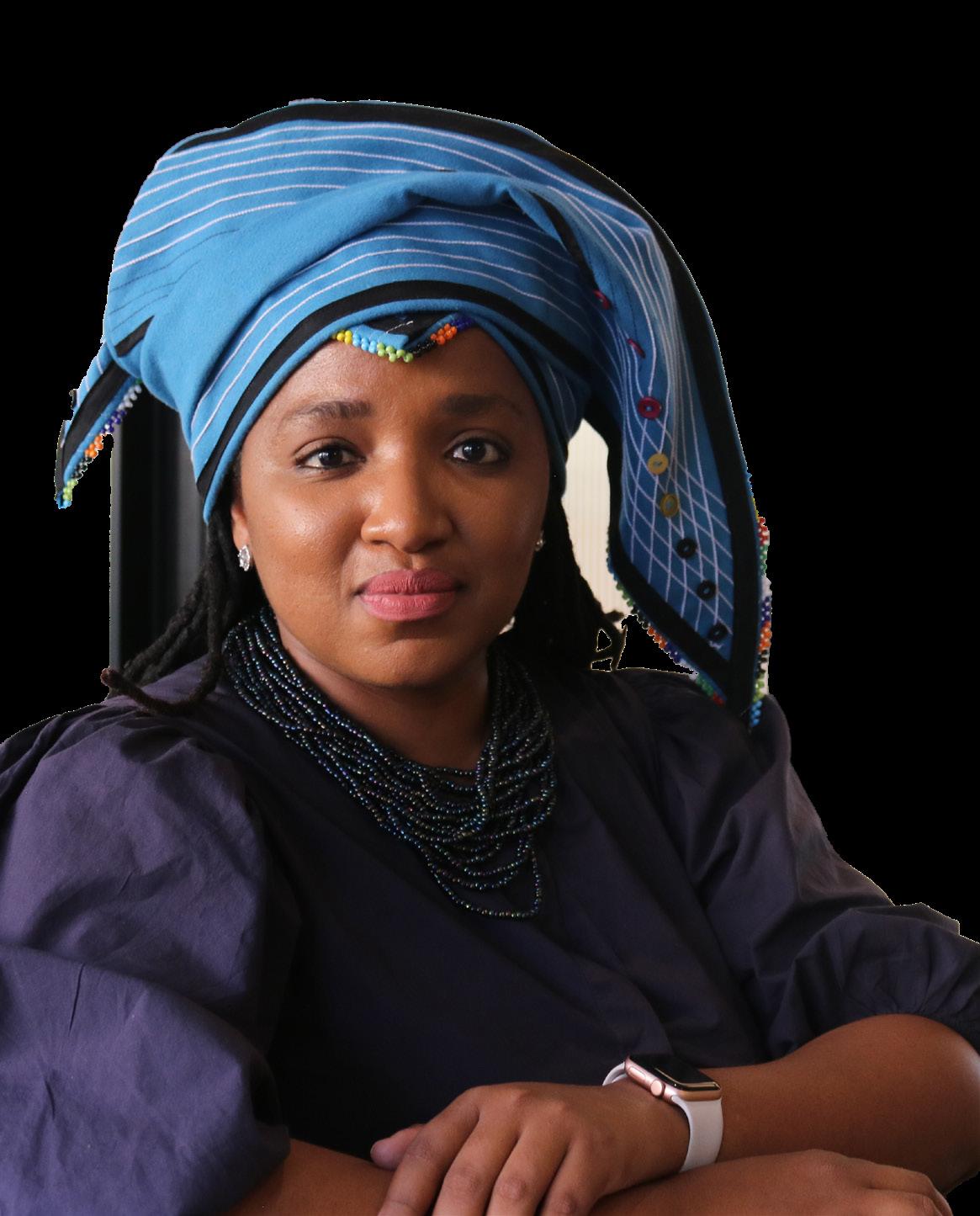
18 www.transformsa.co.za COVER STORY
Linda Maqoma
Written by Dumisani Hlatswayo and Saki Mabhele
Chief Maqoma was a young leader with no desire to take up arms against the British. Despite this, he was forced to fight and became an unexpected resistance hero. Maqoma’s mastery of guerrilla tactics led him to conquer his enemies during the Xhosa Wars of dispossession, proving his tactical and strategic brilliance in the face of great adversity.


Jongusombomvu’s impact on South Africa is echoed in his descendant Linda Maqoma, the current president of ABASA and founder of Nomatshawe Group. She carries her ancestor’s legacy forward as she leads initiatives dedicated to advancing African communities socially and financially, a vital contribution to shaping Southern Africa’s history. Her childhood was marked by her grandfather’s exile and the consequential battle for freedom. Growing up, she experienced a newfound sense of determination to transform racial inequality that would stay with her far into adulthood.
She was born in Alice in a small town also known as eDikeni, which means a valley that runs through. “Then we moved when my grandfather came from exile, and there was liberation in the country. We relocated to Fort Beaufort; that’s where the farming environment is,” she told TransformSA. “I was very proactive, someone who would like to earn what she got,” she added.
Linda’s life was a dichotomy of school and farm. While she spent most of her formative years in boarding school, she always returned home to work on the family farm during recess. In this way, she developed an appreciation for both hard work and education.
“At some point, my grandmother was named female of the year in the Eastern Cape. And those are some of the things I was exposed to; business-minded, businessoriented, hands-on women. So I never expected that things would just land on my lap,” she said.
In his riveting book, Maqoma: The Legend of a Great Xhosa Warrior, Timothy Joseph Stapleton brings to life the legacy of Jongumsobomvu. In one of the
chapters, the author wrote about a quest by Linda’s grandfather to retrieve Jongumsobomvu’s remains from Robben Island. He also questions the manner in which Chief Maqoma died.
“Many theories exist about how Chief Maqoma died. If you read the book, you will see that there is a wound from a postmortem. In his fight against injustices in our country and land, he ended up being held at Robben Island, but my grandfather made sure his bones came home,” explained Linda.
Chief Maqoma’s recent recognition has been a crucial step forward, yet Linda believes there is still more to be accomplished to pass on the torch. “ What are we doing in our day and age? As young people, what are we doing to carry on the baton? In his time, he fought against the same things, although they were not in the same form,” she said.
Linda’s young life was upended when her mother suddenly passed away. She had already been dealing with the challenges of growing up in a boarding school but now faced an even tougher task - forging ahead without one of her closest confidantes by her side. Despite this trying time, Linda still cherishes the last memory she shared with both parents and brother; during their visits to Linda’s boarding school, they enjoyed each other’s company before going out for what would be their final family outing together.
“It was an amazing day. A couple of weeks later, she had a short illness that I didn’t know about. I remember coming back from the Anglican church, then my aunt came while I was in the shower. She was dressed in black, and you could see something was wrong. She told me that my mother has passed away,” Linda said.
“The only thing I remember is that I never cried. I didn’t grieve my mom as much as I should have. Many times, you think you need to be strong for others. At the time, I had a six-year-old brother, so I felt like if I broke down, he would too. So I had to assume that motherly role,” she added.
Linda Ah! Jongumsobomvu is an incredible splitting image of her mother, adopting many of her personality traits and habits. Although her mother was an accomplished accountant, she will always be remembered for her immense generosity and kindness. On the other hand, Linda shares a special bond with those around her and cherishes the importance of family above all else. “My mother would normally do books for the farm; then I will be given those capturing roles.”
“It was my aunt, who became my godmother by default. When I lost my mom, my aunt became very close. She made sure she came, so she was doing a Bcom law degree at the University of Port Elizabeth (UPE). She then said it’s either we apply for actuarial science or we do this Bcom accounting thing. Then we applied; that’s how I got in at Wits.”
Along the way, financial struggles caused Linda to take time away from her studies at Wits University. However, that didn’t deter her from pursuing her dreams.
“I didn’t finish at Wits, but that was the starting point for my academic journey. After my second year, I had to come home. It was a situation where my dad couldn’t finance my studies,” she recalled.
After her stint at Xolani Phumeza & Associates (XPA), Linda decided to pursue higher education and enrolled at Unisa and Fort Hare University.
Renowned scriptwriter Loyiso Maqoma (Linda’s uncle.) extended a life-changing offer to Linda, giving her a chance to further her education and reach for those dreams she had put on hold. Without hesitation, she welcomed this incredible opportunity with open arms.
“My uncle gave me the money to register, and I went to Fort Hare to find out how to complete my degree. That was the last time he had to pay for my tuition because my resourcefulness picked up. Once I was there, I found out that there were bursary opportunities.”
Volume 33 • 2023 19 COVER STORY
In the majestic heights of Ntaba ka Ndoda mountain lies a monument of one of South Africa’s greatest heroes. At this holy site stands an ode to Xhosa warrior Jongumsobomvu Maqoma (1798-1873): a life devoted to resisting apartheid.
Although she did not realize it initially, her dogged determination would eventually pay off when KPMG signed her up for articles, all while already pregnant with her daughter.
Upon starting her career as a Trainee Accountant at KPMG, Linda’s hard work and dedication paid off. She got promoted to become Audit Supervisor. Thereafter, she became a successful audit manager in Financial Services. A few years later, she would pursue her entrepreneurial dreams and founded Nomatshawe Group. She now focuses on helping individuals unlock their potential as consultants.
Her journey to become the leader of a nonprofit organisation started at university, where she represented her peers as a Student Representative at Fort Hare. The CTA programme that Linda encountered was failing its black students, inspiring Linda to advocate for their rights. The transformation gap within the fraternity motivated her to join ABASA, which is under her leadership today.

Linda’s father always told her to remember where she came from. He warned against getting too complacent in success and reminded Linda that with privilege comes responsibility - stay grounded and be aware of the world
around you. “As you rise and your head is in the clouds, your feet should always be on the ground. Because you have a responsibility, you need to know what’s happening on the ground,” her father advised.
Unsurprisingly, Linda and her fellow learners took a stand, determined to put an end to the injustice black students were facing at Fort Hare. Unwilling to accept any further attempts by white lecturers to stifle the transformation of their education sector, the brave young students marched together with one united voice: “No more!”
“We stood up for some of those things to say; how does this make sense? That we go through the same hurdles throughout the year, but at the end of the year, white people are passing, but black people are failing,” she said.
Drawing on the invaluable wisdom gained through her transformation journey, Linda firmly believes that helping the youth reach their fullest potential is essential for laying a better foundation for future generations.
In 2022, only 17% of hopeful Chartered Accountants passed their board exams. The South African Institute of Chartered Accountants (SAICA) administered the challenging Initial Test of Competence as part of this process. The programme is one step in qualifying to become a CA in SA. In response to the low pass rate, Linda has proposed an innovative solution: Go back to basics and tackle the problem at its source.
“Systemic issues need to be resolved first. And if our education system is also designed in such a way that we are not equipping a black child to compete with their white counterparts, we are not going to win,” she explains. “Firstly, students are not taking the right subjects. And if they do, they are not structured in a way to build selfconfidence.”
Linda relaxes and recharges by diving into the extraordinary world of music. It’s not uncommon to find her listening to different genres; from jazz to hip hop. Or explore captivating stories through books.
20 www.transformsa.co.za
COVER STORY
As you rise and your head is in the clouds, your feet should always be on the ground. Because you have a responsibility, you need to know what’s happening on the ground.
CREATING AN INCLUSIVE FUTURE

The BEE Chamber is not a traditional consultancy. We’re your B-BBEE consulting partner. We aim to enable businesses in implementing South Africa’s diversity and equality policies. The BEE Chamber’s dedicated services focuses on the support and development of B-BBEE Practitioners, internal capacity building and the development of your B-BBEE best practices to a level of excellence. Enabling B-BBEE Practitioners to expand their horizons and skill sets are at the core of what we do. Economic transformation can only happen due to organisational transformation, and organisational transformation can only happen through effective change management by B-BBEE Practitioners. Partner with us on this journey.
 THE BEE CHAMBER, YOUR PARTNER FOR GOOD CORPORATE CITIZENSHIP, DRIVING ECONOMIC TRANSFORMATION & POVERTY ALLEVIATION.
THE BEE CHAMBER, YOUR PARTNER FOR GOOD CORPORATE CITIZENSHIP, DRIVING ECONOMIC TRANSFORMATION & POVERTY ALLEVIATION.
explore the various options. SEND US A MAIL TO: OR CALL: 011 726 3052 services@bee.co.za CHAMBER
CHAMBER THE BEE
UBUNTU AND THE ROLE OF THE STATE
How might Ubuntu account for a good society?
By Dr Motsamai Molefe
Ubuntu is an African value system that offers its own conception of good by specifying the standard of what is deemed excellent, virtuous or permissible. Typically, Ubuntu is explained in terms of the aphorism ‘a person is a person through other persons’. There are at least two ways we can approach the idea of a ‘good society’. One way might emphasise the duties citizens have towards the comity. Another way may be to focus on the duties the state has towards citizens. We experience our lives under the influence of the state and its social institutions, which can improve or deteriorate the conditions of our existence. I define a ‘good society’ in terms of the duties the state has towards its citizens. The essence of a good society pivots on the overall social conditions that the state ought to create and sustain for human existence to be possible and meaningful.
To construct an Ubuntu-based vision of a good society, I divide this article into two sections. I begin by explaining Ubuntu. I will identify the two components of Ubuntu – human dignity, and human excellence. Secondly, I will explain the role of the state in relation to these two components of Ubuntu. Ubuntu defines a good society as one in which the state creates conditions to protect a person’s status of dignity and it equally provides empowering conditions for individuals to flourish in society.
Ubuntu as a value system
Scholars explain Ubuntu by appealing to the aphorism ‘a person is a person through other persons’. The word person occurs three times in the aphorism. To make my case, I will limit my analysis to the first two instances of it – ‘a person is a person’. The first instance of ‘a person’ refers to the ordinary use of the word, which simply refers to a human being. We might interpret the first instance of ‘a person’ qua humanity to imply the primacy of humanity in the moral domain. Ubuntu offers us at least two ways to
recognise the primacy of humanity. Firstly, Ubuntu embodies a human-centred moral system. In a human-centred approach, the source and goal of morality essentially involve securing the human good. Steven Biko’s (1978) comment best explains the human-centred approaches typical of Ubuntu, when he opines –
One of the most fundamental aspects of our culture is the importance we attach to (hu)man beings. Ours has always been a (hu)man-centred society. We believe in the inherent goodness of (hu) man(ity). We enjoy (hu)man for himself … Hence in all we do we always place (hu)man first.
Ubuntu recognises the importance of humanity and equally prioritises it over other elements in nature. The priority of human beings does not imply that God and the natural community have entirely no place in the moral domain. Far from it, the point is that morality is the drama that plays itself out in the human domain. The divine will and environmental interests are intrinsically connected with human conduct and good.
Secondly, the first phrase ‘a person’ captures the idea hinted at by Biko when he talks of African cultures believing in the ‘inherent goodness of humanity’. The idea of inherent goodness denotes human dignity. ‘Human dignity’ denotes the inherent and superlative worth associated with the fact of being human. The notion of ‘inherent’ denotes that the value of a human being derives entirely from their nature. That is, so long as someone is human, they have intrinsic worth that is theirs entirely because of their human status. The notion of ‘superlative’ indicates that it is the highest value possible of its kind. That is, in the natural world - the vegetal and animal kingdom – humanity has the highest value. It is because human beings have this dignity, that we owe them the utmost respect.
Ubuntu ethics focuses on human persons. Firstly, it explains the foundation of morality in terms of human beings – morality derives from and about
the human good. Secondly, Ubuntu is an ethics of dignity. It espouses the view that every human being is a bearer of inherent worth deserving of equal recognition and utmost respect. Ubuntu requires us to see persons for what they truly are, beings of dignity, and we ought to treat them as such.
The second phrase in the aphorism ‘a person is a person’ refers to the goal of morality. Ubuntu requires a human being, a person, as the moral agent, to become a person. No tautology is intended here since the second instance of the word ‘person’ is normative; referring to a good human being. According to Ubuntu, a good human being is one that achieves virtue i.e., a human agent that develops a good or virtuous character. When a human being actually achieves personhood, we say they have ubuntu. The goal of a person (a human being) is to become a person (to have ubuntu). To have ubuntu means to have a good character. Tutu (1999) captures the goal of Ubuntu in this fashion –
When we want to give high praise to someone we say, “Yu, u nobuntu”; “Hey, so-and-so has ubuntu.” Then you are generous, you are hospitable, you are friendly and caring and compassionate. You share what you have.
In summary, Ubuntu ethics is about a human being (a person), as a bearer of inherent dignity, becoming a person (achieving ubuntu). To have ubuntu means to have a character that exudes virtues like generosity, kindness, friendliness, and so on.
We can now reflect on the role of the state in light of this rough account of Ubuntu.
Ubuntu and the State
Ubuntu ethics has two crucial components –human dignity and human excellence. We can now proceed to define the role of a state, or a good society, in terms of human dignity and human
22 www.transformsa.co.za
28 www.transformsa.co.za
THINK PIECE




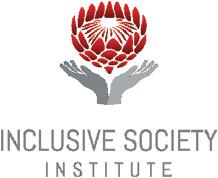
• • • THINK PIECE
GERMINAH NYIKANA
is the HR Executive for Click Group
Please tell us about your career background.
When my plans to study electrical engineering did not materialise, I switched to humanities. I got my BA in Humanities because I couldn’t decide between psychology and technology. I pursued an Honours degree in Information Science because the concept of receiving and imparting knowledge, as well as understanding how people learn, has always stirred up my interest. To better understand how to improve people’s knowledge, I earned a Bachelor of Philosophy with a major in Information Management. I also hold a Master’s degree in coaching management.
Please share your journey to become HR Exec for Clicks Group?
I have 20 years of experience in human resources, learning and development, talent management, and transformation from several top JSE-listed retail companies, and now an HR executive for Clicks Group. I began my retail career with The Foschini Group in 1999. In 2007, I joined the Clicks Group as Group HR Manager, where I was in charge of learning and transformation. In 2018, I was the Head of Learning at HomeChoice, and in 2020, I joined the Shoprite Group as the Head of Retail Studies, and later Talent Solutions. On July 1, 2022, I re-joined Clicks as Human Resources Executive.

What are your on transformation?
We have to talk about it, understanding what it is exactly we’re talking about and the elements around it. It does not just fall into place it is a work
in progress because of systemic issues so we have to constantly look at how we reflect the environment and society that we work in. personally, I go about each day keeping in mind that there are a number of young people watching me as an epitome of hope and possibility. I don’t take that lightly because they see themselves in the senior leadership of the organisation. I understand that there are people who came before me. Our CEO also mentored me when I was young it and that’s where I learned that I should also find people to take to the top with me as I get those opportunities this why I coach young people. I partner with them the way I was also robed in to pave the way for future generations. Transforming the organisation to prove that with a diverse leadership you can still be profitable. Transformation is a responsibility for each of us as leaders.
What is your leadership style?
When I coach young people I want them to leave knowing I saw them. A lot of people
go unseen be in corporate or in their day to day life. My academic coaching background influenced my approach to leadership. There’s a touch of playfulness and seriousness in the delivery. Sometimes I’m at the back and some days I’m in the front. I always tell my team “I’ve got you”.
What drives you?
I’m driven by the development agenda, my optimism and believe in young people. I see them, pour into them and show them what it is supposed to look like. I am grounded in faith. I believe in the higher power. I am one of those 5 am club members, except im not reading a book I’m on my knees praying.
What advice would you give someone who wants to follow in your footsteps?
Show up authentically, show up as you are and we’ll help you with what the possibilities are.
24 www.transformsa.co.za
PROFFESSIONAL
DIVERSIFYING ICT IN EDUCATION
Andiswa Msi is
IT Academic & Office Solutions at the North West University.
the Director of
Q: Briefly give us your background
Many believe I am from the town of Umtata, the truth is that I was raised in the rural village of Baziya. I attended Dalindyebo Senior Secondary School, which at the time was a boarding school, I do not come from a Model C educational background. Since there was little career guidance available when I matriculated, I wasn’t sure what I wanted to study. My older sister desired to pursue a career in food service management. Although this was not my calling, I was able to graduate at the top of my class. After that, I decided to enrol in BCom, and luckily, someone suggested that I apply for a scholarship.
Q: When did your career kick off?
A: In my early years, I worked for many organisations, but Woolworths South Africa in Cape Town was the one that best reflected the woman I am now. Here I joined project management, change management, and financial planning. I have put these ideas into practice throughout my professional life. I joined Walter Sisulu University’s Health Science department after working at Woolworths, where I performed various tasks, including managing IT systems and business plans that were required to be filed with the government. I then transferred to the Eastern Cape Department of Health where I performed marketing since I am a highly ambitious and spirited person.

Q: How did you transition from owning your business to where you are now?
A: I took a bow from my company, ANDSM, the time had come for me to move on. You know when athletes run they know when to handover the baton.
When I built this company my goal was a not future oriented but it was aimed to pay the bills at that time.
Q: Do you think black women are slowly entering leadership roles now in universities?
A: According to what I was told, I am the first black woman to occupy this position at the university. However, during my interview, my abilities were the only thing brought up. The colour controversy arose as a result of the university’s ongoing restructuring, or “cultural change.” As a black woman, I want to succeed because I want to create change. If you are clear in your mind and have a vision, you can overcome obstacles.
Q: What challenges do you think institutions face in the journey of education transformation? And how are planning to bring change into the environment?
A: Many institutions continue to face difficulties related to diversity. Issues of race are still present in former Model C schools today. However, this is not the only issue; as you may have noticed during the pandemic, there is also the issue of the digital divide, where we discuss the haves and the have-nots. In addition, we observed the institution’s poor financial condition and minimal educational resources.
It’s time to bring about change and create a better atmosphere, and as a leader, I’m ready to be put to use. I am on a quest to find assistance and solutions, and my goal is clear. I serve as a bridge between education and the digital world. We are now busy with digital strategy to bring every student on board, no one must be left out.
Volume 33 • 2023 25
PROFFESSIONAL
ARE SA MINES READY FOR DECARBONISATION?
Are South African mines prepared to reduce Scope 3 emissions? PwC’s newly released report seeks to address this critical question.
Carbon emissions are primarily caused by hazardous explosives and blasting devices used in mines. Until our mines implement environmentally friendly methods, we will have virtually no chance of reducing our carbon footprint and decarbonising.

Several months ago, PwC released a mining report that painted a picture of what our country's mining industry could look like in the future. In a report entitled "SA Mine 2022, Level up or Reset", the report examines the financial results of the mining sector and other factors, such as the economic context and infrastructure challenges the mining sector faces.
Let's first examine how mines performed financially:
26 www.transformsa.co.za MINING
How did South African mines fare financially?
Overall, our mines have performed well from a financial standpoint. The PwC report notes that South African mines performed better than expected in most areas.
"Distributions to shareholders more than doubled to R190bn, Capital expenditure grew by 36%, and taxes paid increased by 14% as South African mining companies maintained profitability at last year's high levels. Growing demand for commodities in the sector saw record rand prices for the platinum group metals basket, iron ore, and coal, while most other South African commodity prices remained at relatively high rand levels," says the report.
So what exactly is decarbonisation?
Decarbonisation refers to reducing the amount of carbon dioxide (CO2) released into the atmosphere. The primary objective of decarbonisation is to reduce mining emissions.
The world as we know it faces the challenge of achieving a global rate of decarbonisation of 15.2% per annum to reduce global warming. As a result, South Africa and the world should strive to achieve global warming of 1.5°C.
• According to PwC's report, South Africa should prioritise decarbonisation since protecting the environment negatively impacts climate change.
• The report emphasizes the importance of a holistic approach to environmental crises and social upheaval. This includes educating the public about the impacts our environment can have on our economy.
Transitioning from coal gasification and steam methane processes to one powered by green hydrogen will significantly reduce the mine's carbon footprint.
Is a greener mining sector possible?
Among the major sectors of our economy, mining is the only one that is unsustainable. As a result, it depletes finite resources and pollutes and destroys the natural environment. Despite its relatively small contribution to global CO2 emissions, mining is a major contributor to South Africa's CO2 emissions.

A total of 81.4% of the country's electricity was generated from coal in 2021, of which the mining industry used 60%. That leaves us as a country grappling with two issues of decarbonising: sustainable and reliable power supply. According to PwC, addressing these dual challenges will require the mining sector to invest in alternative and renewable energy sources and planning.
"The global energy transition won't be smooth, as was reflected in the record coal prices experienced for the year. This report recommends that South Africa, as a coal exporter, maximize the value of its coal by supporting global energy supply stability.
In recent years, new mining technologies and regulations have significantly improved mining efficiency and reduced environmental impact. The more efficient mining techniques are, the less waste they produce, which makes them much more environmentally friendly. The availability of renewable energy will have a profound impact on how we operate modern mines and reduce emissions.
Light at the end of the tunnel
South Africa's light at the end of the tunnel is "Operation Vulindlela," a joint initiative by the presidency and National Treasury. The report also notes other strides that have been made in transforming the mining industry.
"South Africa has committed to decarbonising its economy in line with the United Nations (UN) Framework Convention on Climate Change and the Paris Agreement. The Minerals Council of South Africa has further endorsed this commitment, with the mining sector to set a target of achieving Net Zero (NZ) by 2050," says the report.
What are the transitions SA mines undergo?
A structured approach would be the most effective way for South African mines to transition from fossil fuel-based electricity to clean, sustainable energy from wind and solar. According to PwC, the process will begin with a baseline assessment of the organisation's energy mix, electricity demand, and emissions levels.
The report also recommends the following:
• Mines can reduce electricity and energy consumption by evaluating and optimizing their processes.
• Diversify its energy supply with the introduction of renewable power generation.
Conclusion
Cabinet approved a just transition framework in September 2022. The plan outlines a pathway for climate-resilient development in South Africa, involving every sector, focusing on improving lives. In the mining context, this can only be accomplished through adopting environmentally friendly practices by the mine.
However, when implemented properly, environmentally friendly mining will be a critical component of sustainable development. Our mines can achieve this goal by using cleaner technologies to reduce pollutants and minimize water and energy usage.
Volume 33 • 2023 27 MINING
Among the major sectors of our economy, mining is the only one that is unsustainable.
KASI DELIVERY APP ONBOARDS 14 BIKES
Freddy Mahhumane
Founder of KasiD a food delivery App that can also be accessed through WhatsApp. The App offers informal restaurants in the township of Thembisa, Soweto, and Mamelodi easy and fast food delivery services. Restaurants can reach customers
15km away, delivering to their doorstep. KasiD increased the restaurants’ revenue tremendously within 2 months, achieving sales of over R 200,000 in the KasiD app.
Please give us your background. What are your qualifications and previous employment?
I’m from Thembisa. I did not complete varsity mainly because of my interest in entrepreneurship. However, I am a huge learner. There are various methods of acquiring knowledge, including digital learning and learning useful skills from people we meet. I’m currently teaching two of our drivers programming; they won’t have to attend school.

How did KasiD start?
Big competitors, such as Mr. D and Uber Eats, do not service informal restaurants and have a lot of red tape when it comes to onboarding them. I wanted to provide job opportunities for young people in and around my community. I assist them in obtaining bike training and hire them as bike drivers.
What are some of the challenges you’ve faced in the business?
Developing a marketing strategy because this type of technological advancement had not been thoroughly tested in the townships. Restaurant owners were hesitant to go digital. End users were also nervous to entrust us with their banking information. For a while, they preferred a cash-on-delivery service. We teach them how to use the app while also building trust with both the restaurants and their customers. The safety issue hit me when Uber Eats announced that they were discontinuing operations in Soweto due to attacks on their bike drivers. We partner with the restaurant owners by giving back
10% of the delivery fee to them, this also helps build relationships with the community. I recognize that to help the community grow, I need to invest in its businesses. This puts us at a much lower risk of criminal attacks.
How would you explain a day in the Kasi D business operation?
We have 14 delivery bikes in Thembisa. We also accept people who ride their bikes. As of next year, we hope to have 10 people in Protea Glen and 10 people in Mamelodi East riding their bikes.
What does it to qualify as a registered restaurant on KasiD?
All you need is at least a 2-plate stove. The business doesn’t have to be registered, we look at the quality of the food, the packaging and the presentation as a whole. We train restaurant owners to see themselves as competitors to large fast food outlets.
Have you always known that you’re an entrepreneur?
My parents taught me entrepreneurial skills. They used to sell veggies and snacks growing up and we helped pack all of that. I didn’t know at the time that I was learning commercial skills. Years later, when I proposed a solution for Multichoice and they went ahead with the idea, I realized I had a different trail of thought to problems.
28 www.transformsa.co.za
ICT
BUILDING INTERNET BIT BY BIT
How did you start?
After matric, I worked as a part-time call centre consultant while studying Information and Communication Technology (ICT) at the Cape Peninsula University of Technology. There I got to learn networking engineering, how to make 2 devices connect and how the internet is formed. After varsity, I joined Cell C doing sales and marketing going from different townships trying to get the brand out there. I would go on a Cell C bus doing card activations and selling airtime. I also worked for Vodacom, and Spark ATMs. That’s when I learned that companies that are proving ICT were providing for suburbs and as a young person from Khayelitsha and Inyanga, I saw a gap.


What sets your brand apart from others?
Our services give people the experience of being in another place while still within the same township. Proving township entrepreneurs with Fibre and landlines helps them connect with a much larger audience. Creating domain registration for them to get a website with a pre-built e-commerce platform so they can operate online. In the company, we prioritise every employee’s health, and working 9-5 feels like mental slavery. We don’t employ them to take up their time. I hope to see it as a business partnership, they are taking their time and skills and putting them into Sky Internet. They can work from anywhere with our internet-based systems, we have a workflow monitoring tool that can track work performance.
What are some of the challenges you faced when you first started?
Even though I decided to start an internet service providing company back in 2016. Sky Internet was registered in 2019. As an employee myself I couldn’t find time to have necessary meetings. The NYDA for instance, they have an entrepreneurial program course that has Monday – Friday classes and I could not take time off work. Meaning I missed that business funding opportunity.
How big is Sky Internet’s coverage?
We can provide services on open network nationally. However, we’re still trying to grow a decent amount of subscribers in Cape Town we partnered with Opentel and Vuma in providing fibre in townships like Langa, Nyanga, and Khayelitsha we provide internet services using their open fibre network. In places like Khayelitsha with parts of it being squatter camps, we can’t reach with fibre as it requires an underground connectivity process so we provide wireless coverage.
Volume 33 • 2023 29
ICT
Lorna Mlozi (29) from Gqeberha grew up in Cape Town and is the CEO and founder of Sky Internet.
AKHONA MOSIANE:
A DRIVING FORCE IN THE AUTOMOTIVE INDUSTRY
Q: Who is Akhona? I was born in Odendaalsrus, Eastern Cape, South Africa, and completed my education in Nqamakwe. I went to the University of the Free State to pursue my BCom Accounting degree. I attended public schools and had teachers who were very intentional with getting the dedicated students ahead. My father worked as a Machine Operator underground in the mines. He raised four children, three of whom attended tertiary institutions.
Q: How did the decision to open a dealership come about? I started working as a bookkeeper in a dealership. There I grew in different leadership roles. However, I wanted to work in operations an opportunity presented itself in the form of a Trainee General Managers program pioneered by Barloworld I took it and never looked back. The plan was to ensure that I wasn’t working at age 35 because I wanted to make a meaningful difference. In 2020, I began talking with a colleague about opportunities in the automotive industry. When it came we were fortunate enough that it was with a brand that we both love.
Q: Can you say you’ve changed the automotive industry? Yes, because when I joined the Automotive Industry you could count female managers on one hand. Even the ones that made it through had to work 10 times harder. My role has been to show young girls that there is a career in Automotive. Is it hard? Yes, it is but it can be done.
Q: What difficulties did you encounter when you first started out? I was 23 years old when I became a manager. In a team consisting of a 57-year-old, a 48-year-old and a 45-year-old. The other team members were young but older than me. There were only two women on the team, myself and a finance and insurance manager. Every decision I made was questioned by the senior team members. It was tough but I never thought about quitting, I always thought I have to be there and be vocal. If it means losing my job then so be it. I have always stood up for the truth and treated every situation objectively without relying on emotion. In addition, I’ve always protected my team and made sure no outsider can disrespect my team, and in doing so I’ve earned the respect of almost everyone I work with. For me, fairness and toughness go hand in hand.
Q: What are your business’s long-term goals? We want to hire as many Black females as possible, groom future business leaders, and encourage entrepreneurship. God willing, the goal is to acquire more businesses to effect meaningful change in the Black community.
Q: What adv ice would you give young women following in your footsteps? If you have a dream that scares you, it is simply not big enough to stop you from pursuing it. Challenge the status quo, don’t settle for anything less than what you want, and trust in God in everything - there is no such thing as too much ambition.
CHANGING THE FACE OF MINING
The company has created 96 new jobs and is in the process of creating more jobs. SKM has prioritized training and development for all employees, particularly women. TransformSA touched base with Khuli to learn more about his company.

Tell us about your company and your role in it. I am Kgolagano Matshego, affectionately known as Khuli. I’m an entrepreneur in the mining space. I’m the Managing Director for Sedibelo Kgabo Mining (SKM), a drilling company I founded with my brother Tshiamo. SKM is a 100% black-owned mining services company, with its roots in Lesetlheng, North West Province, South Africa.

Please take us through the process of drilling in the simplest form. Production Drilling, in the simplest sense, is drilling lots of holes into the ground to be mined, more like Swiss cheese. The holes have to be equally spaced. For instance, five metres apart, each should be drilled to 15 metres depth for the blasting guys to load with an equal amount of explosives later.
Our client marks out the hole locations in the pit, and our operator trams the Sandvik drill rigs to each drill point. The rig has a hammer, rotational action chews the rock, and blows the rock fragments to the surface. The machine has tilt metres and a depth counter, so operators can ensure they’re drilling vertically and stop at the right depth. Once complete, each hole is marked and covered, and the machine is trammed to the next spot. We drill several hundred such holes each day, so it’s quite repetitive.
Health and safety in mining are usually one of the biggest challenges. Have you encountered this problem?
The health and safety of our employees are the first things on my mind every morning. Nobody starts a machine until everyone is 100% sure all safety protocols have been observed. We have been operating for over 365 days without a single injury! Every day our employees go home to their families safe and sound. I am happy to say that from the start of operations to this today, we have not had a single safety incident or injury to any of our employees.
Do you think sustainable and efficient mining seems near impossible? Sustainable and efficient mining, to me, is not impossible. It’s essential. We’re mining on our land, and our children will inherit whatever legacy we leave. The limit we have is that resources are finite and will eventually be mined out. Still, we must mine responsibly, taking due care, rehabilitating as we go, and ensuring all our people benefit, not just a few shareholders sitting offshore.
30 www.transformsa.co.za
2.
3. 4.
1.
IMKHITHA NTSHANGA

is cementing herself as an impactful business leader as the founder and CEO of MIBN Projects

JOSEPHINE MALAKOANE
is the Founder and CEO of Basadi Automotive Group (pty) Ltd
Briefly tell us about who Imkhitha is?
Oh, my goodness I do not know if I can keep it brief there are so many layers to me. So Imkhitha is a lady born and bred in Mthatha in the Eastern Cape in a rural village called Qokolweni. I studied there for high school and then I later moved to Cape Town to try to figure myself out here.
Walk us through your journey of becoming an entrepreneur
Initially, I studied psychology. However, I could not venture into that industry because there were no jobs at that time. As a mother, find balance in whatever life dealt me with. So I got a job as a receptionist after being a call centre agent for a few years. I am a curious individual, while I was a receptionist I started assisting my director and also around the office. During that time I was told I could make it as a project manager. So begin my research on how to qualify as one. I tried enrolling at Varsity College for a project management course, bear in mind that I had no idea what I was doing initially but I said to myself “if this person thinks I can be good at it, I will try”. In 2020, I founded a 100% black-owned consultancy, MIBN Projects, where I focus on the nuts and bolts of ensuring that all projects are completed timeously, on budget, and in scope.
What is the nature of your business? MIBN Projects doesn’t just focus on project management but on construction, design, and finishing. Because I am a person who likes to juggle many things, I also ventured into logistics. We just finalised our partnership with a logistics company.
What challenges do you normally face? Being a project manager comes with many challenges, but my job is irresistible. It’s overwhelming because you’ve to work with about seven other professionals. And those professionals have their team members, so the bug stops with you. And the client is going to ask only you why things didn’t go the way they were supposed to go. You have to be an electrician, you have to be the main contractor, and you have to be an architect.
What does transformation mean to you? Transformation to me is being able to cement yourself as a young person and see yourself as a person of value. Being allowed the time and space to learn, too. We are ten steps behind and need to catch up, which requires learning.
What advice would you give young people? As long as your mind and heart are in it, go for it. And be what you know you can be. You just have to be given the space to cement yourself. Also, don’t be naive and say you do it when you don’t have the background.
What is the nature of your business? Basadi Automotive Group (Pty) Ltd. was established in 2018 by a brave young lady who decided to take on the male dominated industry by assuring excellent service and providing opportunity to females who wish to join the motor industry. We pride ourselves in providing ad-hock fleet related services to allow you to focus on your core business. Our service offers are as listed below but not limited to:
Vehicle transfers
Vehicle carrier movements
Nationwide de-fleet inspections and collections
Nationwide new vehicle deliveries
Fleet towing service
Emergency battery and tyre change services
Mobile car wash
Removal of branding
Vehicle maintenance and tyre supply
How did you get started in your business and what challenges did you face? We faced the same challenges as other small businesses. Despite our efforts to maintain a positive cash flow, we have limited market access due to the big companies making it difficult for us to enter the market.
What are your plans and ambitions for your business? To grow as a company, Basadi Automotive Group must have national offices employing 70% women. Our goal is to become one of the leading vehicle movement companies in South Africa while expanding in Africa.
What makes your business to be unique? Passion for vehicles, service excellence and women empowerment on a different level.
What is your strategy for getting and keeping profitable business? Nowadays, it’s very difficult for small business owners to maintain a positive cash flow, especially in our industry where fuel prices have changed so much. We aim to please our customers by offering excellent service but all our inputs are linked to fuel and the ever-changing interest rates. So the key focus for us since the inception of COVID-19 has been to keep our current customers very happy and try to be very costeffective. The goal of our company is to grow our customer base through good referrals from our existing customers. Despite a slight decline in profitability, we have increased our market share and that’s our long-term growth strategy for now.
Do you think there is a bright future for this line of business in SA? Yes, there is a bright future in our sector especially now that more and more big players are allowing us to join the meeting at the table. We are now more than ever included in the discussion as black females with small businesses. This is a great start although there is still a long way to go to reach the targeted inclusion.
Volume 33 • 2023 31
ENTREPRENEURS
1. 2. 3. 4. 5. 6.
SIMPLIFYING THE BEE LANDSCAPE
ADVISORY
BEE ADVISORY, TRAINING AND STRATEGY DEVELOPMENT
CAPITAL
STRUCTURING AND IMPLEMENTION OF BEE TRANSACTIONS
BEE EXECUTIVE SEARCH TALENT

Transcend delivers BEE solutions that include a bespoke, three-pronged approachAdvisory, Capital and Talent - working together for true transformation. In this way, we find sustainable ways for businesses and people to reach their full potential; accelerate economic growth; and contribute meaningfully to South African societal and professional equality.
Please contact info@transcend.co.za or call us on (011) 442 2433 for more information.
 Photo by Dan Grinwis
Photo by Dan Grinwis
TRANSACTION ADVISORY FOR 100 + MULTINATIONALS STRONG STRATEGIC PARTNER SELECTION COMPETENCE SERVED OVER 56% OF THE JSE TOP 50 56%
OVER A DECADE OF EXPERIENCE



































 THE BEE CHAMBER, YOUR PARTNER FOR GOOD CORPORATE CITIZENSHIP, DRIVING ECONOMIC TRANSFORMATION & POVERTY ALLEVIATION.
THE BEE CHAMBER, YOUR PARTNER FOR GOOD CORPORATE CITIZENSHIP, DRIVING ECONOMIC TRANSFORMATION & POVERTY ALLEVIATION.
















 Photo by Dan Grinwis
Photo by Dan Grinwis


